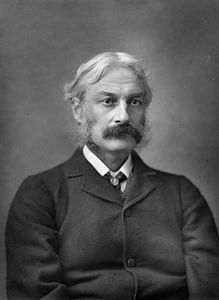Analysis of Traditionary Version
Andrew Lang 1844 (Selkirk, Scottish Borders) – 1912 (Banchory)
As I came in by Dunidier,
An doun by Netherha,
There was fifty thousand Hielanmen
A marching to Harlaw.
(Chorus) Wi a dree dree dradie drumtie dree.
As I cam on, an farther on,
An doun an by Balquhain,
Oh there I met Sir James the Rose,
Wi him Sir John the Gryme.
'O cam ye frae the Hielans, man?
And cam ye a' the wey?
Saw ye Macdonell an his men,
As they cam frae the Skee?'
'Yes, me cam frae ta Hielans, man,
An me cam a ta wey,
An she saw Macdonell an his men,
As they cam frae ta Skee.'
'Oh, was ye near Macdonell's men?
Did ye their numbers see?
Come, tell to me, John Hielanman,
What micht their numbers be?'
'Yes, me was near, an near eneuch,
An me their numbers saw;
There was fifty thousand Hielanmen
A marching to Harlaw.'
'Gin that be true,' says James the Rose,
'We'll no come meikle speed;
We'll cry upo our merry men,
And lichtly mount our steed.'
'Oh no, oh no!' quo' John the Gryme,
'That thing maun never be;
The gallant Grymes were never bate,
We'll try what we can dee.'
As I cam on, an farther on,
An doun an by Harlaw,
They fell fu close on ilka side;
Sic fun ye never saw.
They fell fu close on ilka side,
Sic fun ye never saw;
For Hielan swords gied clash for clash,
At the battle o Harlaw.
The Hielanmen, wi their lang swords,
They laid on us fu sair,
An they drave back our merry men
Three acres breadth an mair.
Brave Forbes to his brither did say,
'Noo brither, dinna ye see?
They beat us back on ilka side,
An we'se be forced to flee.'
'Oh no, oh no, my brither dear,
That thing maun never be;
Tak ye your good sword in your hand,
An come your wa's wi me.'
'Oh no, oh no, my brither dear,
The clans they are ower strang,
An they drive back our merry men,
Wi swords baith sharp an lang.'
Brave Forbes drew his men aside,
Said, 'Tak your rest a while,
Until I to Drumminnor send,
To fess my coat o mail.'
The servan he did ride,
An his horse it did na fail,
For in twa hours an a quarter
He brocht the coat o mail.
Then back to back the brithers twa
Gaed in amo the thrang,
An they hewed doun the Hielanmen,
Wi swords baith sharp an lang.
Macdonell he was young an stout,
Had on his coat o mail,
And he has gane oot throw them a'
To try his han himsell.
The first ae straik that Forbes strack,
He garrt Macdonell reel;
An the neist ae straik that Forbes strack,
The great Macdonell fell.
And siccan a lierachie,
I'm sure ye never sawe
As wis amo the Hielanmen,
When they saw Macdonell fa.
An whan they saw that he was deid,
They turnd and ran awa,
An they buried him in Legget's Den,
A large mile frae Harlaw.
They rade, they ran, an some did gang,
They were o sma record;
But Forbes and his merry men,
They slew them a' the road.
On Monanday, at mornin,
The battle it began,
On Saturday at gloamin',
Ye'd scarce kent wha had wan.
An sic a weary buryin,
I'm sure ye never saw,
As wis the Sunday after that,
On the muirs aneath Harlaw.
Gin anybody speer at ye
For them ye took awa,
Ye may tell their wives and bairnies,
They're sleepin at Harlaw.
| Scheme | axBCa Bbde bfbg bfbg bhbh ijBC dkbk eHxh BcLJ LJic xaba fhlc AHxe AgbG lcxc lcac fgbG xcxc gcgc ifbx kfbc gxbx bbbb bjxc hfdc |
|---|---|
| Poetic Form | |
| Metre | 111011 1111 1110101 01011 101011111 11111101 11111 11111101 111101 1111011 011001 11010111 111101 1111111 111011 111010111 111111 111111 111101 111111 111101 1111111 111101 1110101 01011 11111101 111101 11110101 011101 11111101 111101 01010101 111111 11111101 11111 11111101 111101 11111101 111101 1111111 101011 011111 111111 111110101 110111 1111111 11111 11111101 1111111 1111111 111101 11111011 111111 1111111 011111 111110101 111111 1111101 111101 011111 111111 010111 1111111 101101010 110111 1111011 101001 111101 111111 01011111 111111 01111110 11111 0111111 110101 10111111 010101 0101 111101 111001 1110101 11111111 11011 11101011 01111 11111111 101101 1101101 111001 1111 010101 110011 111111 110101 111101 1101101 10111 11000111 11111 1111101 1111 |
| Closest metre | Iambic tetrameter |
| Characters | 2,880 |
| Words | 608 |
| Sentences | 33 |
| Stanzas | 25 |
| Stanza Lengths | 5, 4, 4, 4, 4, 4, 4, 4, 4, 4, 4, 4, 4, 4, 4, 4, 4, 4, 4, 4, 4, 4, 4, 4, 4 |
| Lines Amount | 101 |
| Letters per line (avg) | 22 |
| Words per line (avg) | 6 |
| Letters per stanza (avg) | 89 |
| Words per stanza (avg) | 24 |
Font size:
Submitted on May 13, 2011
Modified on March 05, 2023
- 3:02 min read
- 104 Views
Citation
Use the citation below to add this poem analysis to your bibliography:
Style:MLAChicagoAPA
"Traditionary Version" Poetry.com. STANDS4 LLC, 2024. Web. 26 Apr. 2024. <https://www.poetry.com/poem-analysis/2842/traditionary-version>.


Discuss this Andrew Lang poem analysis with the community:
Report Comment
We're doing our best to make sure our content is useful, accurate and safe.
If by any chance you spot an inappropriate comment while navigating through our website please use this form to let us know, and we'll take care of it shortly.
Attachment
You need to be logged in to favorite.
Log In